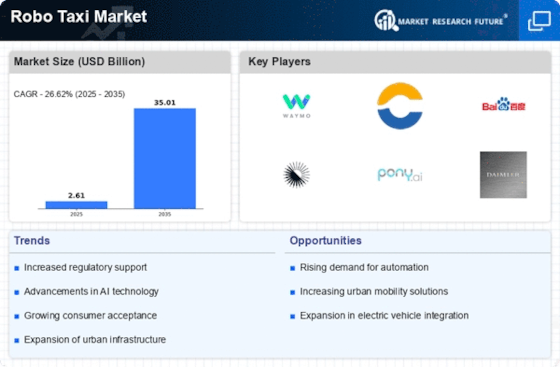Top Industry Leaders in the Robo Taxi Market

The Competitive Landscape of the Robo-Taxi Market
The robo-taxi market, where technology takes the wheel. This dynamic arena witnesses established car manufacturers, tech giants, and nimble startups clashing for a larger share of the autonomous driving revolution. Offering self-driving taxis equipped with advanced sensors, algorithms, and AI, robo-taxis redefine urban mobility, promising convenient, safe, and potentially cheaper transportation options. Let's dissect the key strategies and players shaping this transformative journey.
Key Player:
- Waymo LLC
- Tesla Inc.
- Robert Bosch Gmbh
- Continental AG
- ZF Friedrichshafen AG
- General Motors
- Lyft Inc.
- Aptiv
- GM Cruise LLC
- Ridecell Inc
- Navya
- EasyMile
Strategies Adopted by Market Leaders:
- Technological Differentiation: Companies compete fiercely on technological advancements, focusing on factors like improved sensor fusion (combining data from multiple sensors for accurate environment perception), enhanced AI algorithms for decision-making in complex traffic scenarios, and robust cybersecurity measures to ensure passenger safety and data privacy. Developing Level 5 autonomy (fully autonomous in all conditions) and integrating advanced features like V2X communication (vehicle-to-everything) are key differentiators.
- Strategic Partnerships and Collaborations: Fostering partnerships with car manufacturers, technology companies, mapping providers, and regulatory bodies accelerates innovation, shares expertise, and broadens market reach. Collaborating on developing self-driving hardware and software, building city-specific maps for precise navigation, and securing regulatory approvals for commercial deployment contribute to market growth.
- Focus on Safety and Reliability: Building public trust and ensuring passenger safety are paramount to widespread adoption. Investing in rigorous testing and validation programs, implementing redundant safety systems, and ensuring transparent communication regarding accidents and technological limitations are crucial strategies. Partnering with safety organizations and participating in research initiatives can also enhance trust.
- Addressing Regulatory Challenges: Navigating the complex and evolving regulatory landscape surrounding autonomous vehicles is critical for commercialization. Engaging with policymakers, advocating for clear regulations, and demonstrating compliance with existing safety standards are key strategies. Partnering with government agencies and participating in pilot programs can facilitate regulatory approval.
Factors for Market Share Analysis:
- Number of Deployed Robo-Taxis: Understanding the volume of self-driving cars operating on roads provides insight into market reach and adoption progress.
- Technology Advancements: Evaluating a company's investment in R&D, patent portfolio, and cutting-edge autonomous driving technologies helps gauge its future competitive edge.
- Investment and Partnerships: Analyzing a company's financial resources, partnerships with car manufacturers or technology giants, and secured funding rounds reveals its potential for growth and sustainability.
- Public Perception and Consumer Trust: Understanding public trust in the safety and reliability of robo-taxis is crucial for market adoption. Monitoring industry surveys, media coverage, and consumer sentiment analysis provides valuable insights.
New and Emerging Companies:
The influx of innovative startups is adding new lanes to the road ahead. Companies like Pony.ai (China), Motional (a Hyundai-Aptiv joint venture), and Argo AI (backed by Ford and Volkswagen) introduce novel solutions like robo-taxis designed for specific functions like airport shuttles or first-mile/last-mile delivery. These advancements redefine the possibilities of robo-taxis and unlock new market segments for niche applications and service-oriented models.
Industry Developments:
General Motors (USA):
- January 9, 2024- Announced plans to deploy a fleet of Cruise robo-taxis in San Francisco and Phoenix during 2024, focusing on Level 4 autonomy in geofenced areas.
Waymo (a subsidiary of Alphabet Inc., USA):
- December 5, 2023- Launched pilot programs for fully driverless Waymo robo-taxis in Phoenix and San Francisco, expanding its testing footprint and data collection.
Baidu, Inc. (China):
- November 9, 2023- Unveiled Apollo 7.0, the latest iteration of its autonomous driving platform, featuring improved object detection and decision-making algorithms.









